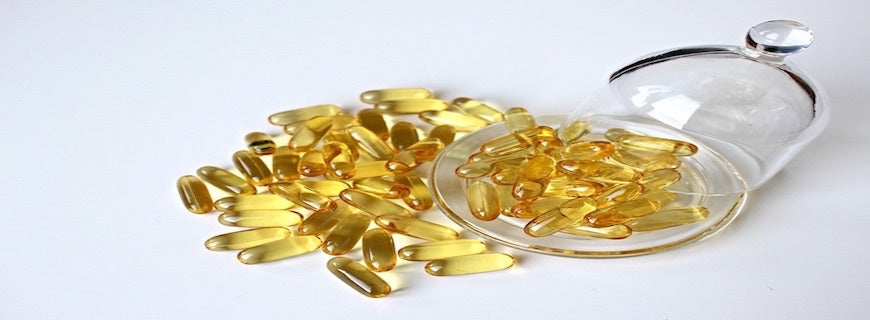According to a population study out of Germany, over 70% of middle-aged women are at an increased risk of heart disease due to inadequate consumption of omega-3 fatty acids.
Omega-3s, which are prevalent in oily fish and in some plant foods, are rightly famed for their brain and vision-boosting properties, although they are primarily linked with heart health.
We suspect that it's not just German females who are at a heightened risk of heart disease caused by omega-3 deficiency. In this article, we look at the content of the study and suggest ways of upping your intake.
Omega-3 Deficiency: A Widespread Problem
The German research team, spearheaded by Sandra Gellert from the University of Hanover, analysed data from 446 middle-aged women to determine which quality nutrients (vitamins, minerals, fatty acids etc) were being most prioritised in the diet.
The results made for troubling reading. While the lowest cardiovascular risk was linked with those who scored over 8% on the Omega-3 Index, an overwhelming 97.3% of all women in the study had levels below this threshold.
In other words, less than 3% were consuming the quantity of omega-3 fatty acids needed to assure heart disease risk reduction.
Just as troubling was the discovery that 9% of participants had an omega-3 status of less than 4% – the figure associated with ‘the highest risk of heart disease’.
Meanwhile, 62.8% were shown to be an ‘increased risk’, their status levels hovering somewhere between 4 and 6%.
Considering cardiovascular disease is the leading cause of death in Europe, with one’s risk rising as the years go by, the news that less than 3% of respondents consume adequate levels is truly alarming.
Particularly given that omega-3s cannot be produced by the human body; to get the benefits of omega-3 fatty acids, we must eat them.
We suspect that German women aren’t the only ones missing out, and indeed a 2016 paper found that “Very low blood levels (? 4%) were observed in North America, Central and South America, Europe, the Middle East, Southeast Asia, and Africa.”
The lowest EPA and DHA blood levels in Europe are in: Belgium, Czech Republic, France, Germany, Scotland, Spain, and the Netherlands.
What are Omega-3 Fatty Acids?
Omega-3s are polyunsaturated fatty acids (PUFAs) which fall into three categories: alpha-linolenic acid (ALA); eicosapentaenoic acid (EPA) and docosahexaenoic acid (DHA).
The aforementioned Omega-3 Index reflects the relative quantities of EPA and DHA in red blood cells, although ALA is also useful insofar as it contributes to normal growth and development in children and the maintenance of healthy blood cholesterol levels.
Cleverly, the body is able to turn ALA into usable EPA and DHA, although it’s much more effective to get EPA and DHA directly from food sources or supplements (or both).
EPA and DHA are associated with all kinds of benefits, most notably to the heart and brain, which is why they’re often referred to as the ‘preferred’ form of omega-3.
In recent years, the field of fish oil study has widened, so that ever more therapeutic benefits are being uncovered. In one study, NASA researchers identified a link between bone loss and omega-3 deficiency. In another, fatty acids were linked with a lowered risk of ADHD in children.
A study published in spring 2018, meanwhile, correlated omega-3 intake with one’s risk of mortality and heart disease.
Analysing data from participants involved in the Offspring cohort of the Framingham Heart Study, researchers learned that the Omega-3 Index had a “significant association” with four of the five major outcomes, including incidence of coronary heart disease and total mortality.
Indeed, those who scored best (over 6.8%) on the Omega-3 Index had a 34% lower risk of all-cause death than those who scored worst (sub-4.2%). The higher group also had a 39% lower risk for CVD.
It is difficult to overstate just how remarkable these figures are. As noted by the researchers, one’s omega status was deemed to be a better predictor for death (and some measures of CVD) than even cholesterol!
UnoCardio 1000: The World’s Best Fish Oil
By far the strongest evidence for EPA and DHA concerns its ability to help protect against heart disease and strokes.
It achieves this by lowering blood pressure, cholesterol and plaque build-up in the arteries, as well as by reducing inflammation and arrhythmias (irregular heartbeats).
There’s a reason why our Mediterranean friends suffer from lower instances of heart disease – and it has more to do with their diet than the lucent sunshine bronzing their skin. Plenty of reason to eat your salmon, mackerel and flax seeds, wouldn’t you agree?
If you decide to incorporate a fish oil supplement into your diet, you’ll probably want to choose the best on the market. As with most supplements, there are literally hundreds of fish oil products for you to agonise over: but not all fish oils are created equal.
The best choice – at least according to independent US laboratory Labdoor – is UnoCardio 1000. Derived from sustainable sources, a single serving provides 1,280mg of high-quality omega-3 fatty acids, including 675mg EPA and 460mg DHA. UnoCardio 1000 has been ranked #1 for quality since 2015.
The vast majority of health practitioners recommend eating two servings of oily fish per week, which is equal to around 500mg EPA/DHA per day. UnoCardio 1000 is a fantastic choice for those who are unable to meet the recommended guidelines.
Of course, there is also merit in supplementing alongside seafood consumption; as when you require a continuous therapeutic dosage of omega-3, for instance.
Most scientific studies into omega-3 use daily doses which range between 1g and 7g omega-3. This is difficult to achieve from diet alone, though other considerations should also come into play.
We refer, of course, to the potential toxicity of fish overconsumption due to oceanic pollution.
As well as omega-3, UnoCardio 1000 yields 1,000 i.u. of valuable vitamin D – a nutrient that everyone should be taking in autumn and winter, according to the Government-backed Scientific Advisory Committee on Nutrition.
Conclusion
Whether you opt for UnoCardio1000 or another high-quality fish oil (UnoCardio X2 and QuattroCardio are sound options), omega-3 supplementation allows you to hit your daily requirements with ease.
The evidence couldn’t be clearer that maintaining healthy omega-3 levels is important for your wellbeing, so don’t – whatever you do – miss out.
Unsure if you’re eating enough omega-3? Then pick up an Omega-3 Test Kit. Remember, with a level below 8%, you are in the Intermediate or Undesirable range. The target range for optimum health is 8-11%.




























Leave a comment